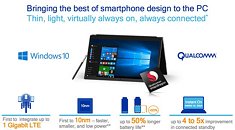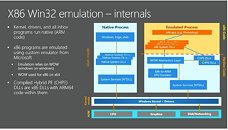Friday, June 9th 2017

Patent War Brewing Between Intel and Qualcomm-Microsoft over x86 Emulation
Intel rigorously defends its hold over its core intellectual property, the x86 CPU machine-architecture. AMD is the only active licencee of x86, and has a competitive line of processors across market segments. It has been a long-cherished dream of chipmakers without an x86 license to have Microsoft, the world's leading PC operating system manufacturer, somehow emulate their Win32 API, which is inherently designed for the x86 architecture, on the more widely licensed ARM architecture. As one of the largest ARM chipmakers, Qualcomm pushed for 2-in-1 (notebook-to-tablet) convertible PCs driven by its Snapdragon processors, which run Windows 10, complete with support for Win32 software, besides Microsoft's UWP apps.
This Snapdragon + Windows 10 reference convertible is so impressive with its battery life and performance, that major PC OEMs such as Lenovo, HP, and ASUS have lined up to license the design and make their own designs. This would have been a licensable form-factor governed by Microsoft, much like how Intel governed the Ultrabook form-factor. This would hit hard at Intel's bottomline, because SoC makers with big R&D budgets like Qualcomm, Samsung, and NVIDIA, who each hold ARM licenses, could go on to power bigger and faster PCs which emulate x86, driving Intel out of the ecosystem. The company dropped the hammer earlier this week, in a passive-aggressive note without taking names, warning Microsoft and Qualcomm to cease from their efforts to build such a device.Intel holds over 1,600 patents related to x86, and assured that it welcomes "lawful competition," but will not stand for "unlawful infringement of patents." Key excerpts from a statement released by the company read:
Source:
HotHardware
This Snapdragon + Windows 10 reference convertible is so impressive with its battery life and performance, that major PC OEMs such as Lenovo, HP, and ASUS have lined up to license the design and make their own designs. This would have been a licensable form-factor governed by Microsoft, much like how Intel governed the Ultrabook form-factor. This would hit hard at Intel's bottomline, because SoC makers with big R&D budgets like Qualcomm, Samsung, and NVIDIA, who each hold ARM licenses, could go on to power bigger and faster PCs which emulate x86, driving Intel out of the ecosystem. The company dropped the hammer earlier this week, in a passive-aggressive note without taking names, warning Microsoft and Qualcomm to cease from their efforts to build such a device.Intel holds over 1,600 patents related to x86, and assured that it welcomes "lawful competition," but will not stand for "unlawful infringement of patents." Key excerpts from a statement released by the company read:
There have been reports that some companies may try to emulate Intel's proprietary x86 ISA without Intel's authorization. Emulation is not a new technology, and Transmeta was notably the last company to claim to have produced a compatible x86 processor using emulation ("code morphing") techniques. Intel enforced patents relating to SIMD instruction set enhancements against Transmeta's x86 implementation even though it used emulation.These are ominous signs that should Qualcomm and Microsoft continue down this path, they will either have to remove Win32 application support from their device, rendering it into a Windows RT-esque potato which only runs UWP apps; or gear up for a long-drawn IP battle between two Fortune 500 companies with billions of dollars in legal budgets.
Only time will tell if new attempts to emulate Intel's x86 ISA will meet a different fate. Intel welcomes lawful competition, and we are confident that Intel's microprocessors, which have been specifically optimized to implement Intel's x86 ISA for almost four decades, will deliver amazing experiences, consistency across applications, and a full breadth of consumer offerings, full manageability and IT integration for the enterprise. However, we do not welcome unlawful infringement of our patents, and we fully expect other companies to continue to respect Intel's intellectual property rights.


58 Comments on Patent War Brewing Between Intel and Qualcomm-Microsoft over x86 Emulation
ARM CPUs can work without x86 emulation.
If Win32 API will be replaced by UWPPolitical comments in a tech forum
Looking forward to see what happens.
Intel is seeing the end in the future and they're gonna throw tantrums.
Too bad for Intel that Microsoft can laugh at Intel's legal budget.
Anyway x86 emulation could be solved by some sort of an agreement with AMD, I doubt Intel could stop that from happening. If not then MS could always go nuclear & move Windows natively to ARM, that'll teach Intel.
That being said, I really can't believe that x86 emulated on ARM processors would be all that fast. Probably fine for basic programs like Word and Excel, but I'd hate to run any halfway demanding game on it or any CPU heavy program(i.e. AutoCAD or Premier).
There is rumor though that Apple could go all ARM, even for the entire Mac lineup, with moves such as metal API or a new file manager in iOS among others. Not to mention the Ax SoC are killer in ST & MT tasks, arguably better than even Intel in that power envelope.
Everything giving Intel a Competition beside AMD will get assimilated or killed.
Intel can only be defeated by a suicide of AMD, so it will be a real MONOPOLY and must be tiled by the Governments.
Does someone know if Vulkan or DX12 could be able to run ARM on something like AMDs abandoned K12 ?
Than only a good Gaming-OS (like Windows) is needed, and x86 is dead. ... this will probably never happen.
You also seem to be unaware or are ignoring AMD Cross patent Deal ie for Example X-64
That Cross IP Patent Deal is the Reason why AMD Licence is ongoing
Your Find that Intel only shared Certain patents with AMD "Post Pentium design" and with no other X86 manufacture
this is why the Rest Stopped manafacture and X86 Design after the Release of the Pentium
Cyrix tried going it alone but gave up after a few years
PS Nvidia also have a X86 licence and still make Embedded chips ( covered in other posts elsewhere and on the Nvidia website)
'safety pin' so to speak, to prevent any lawsuit from government
which they maintained in for over decade,
if Intel want to kill AMD they could have done long time ago
Run like a Dachshund male dog trying to Mate with a Great Dane female
They have ARM licences, and so can make Tegra chips etc.
edit : And the VIA licence is non-transferrable. Via isn't doing much any more, and they can't be bought out for their x86 licence.
Its a shame, They invented mini-ITX and Pico-ITX iirc.....
Intel has only stagnated in desktop CPU performance. Because they were left unchallenged in that area. But guess what? They made huge strides in the mobile space and they seriously beefed up their IGPs (they're not at Radeon level, but they're way better than GMA900). Faulting Intel for stagnating in an already stagnant market, is short sighted at best.
On the other end, if Intel lets this gain traction they might regret it, because emulation will be perfected over time, will have 64bit added so in the end the ARM platform will close in on what Intel has, which any way you look at it, is not good for Intel business. But they deserve it, because they gave up too quickly on the Atom line (probably it didn't generate enough revenue for them).
It will be interesting to see how this turns out, but my bet is that Microsoft won't back down, because they already invested too much in this. They might back down if Intel resorts to ... let's say ... special measures :D